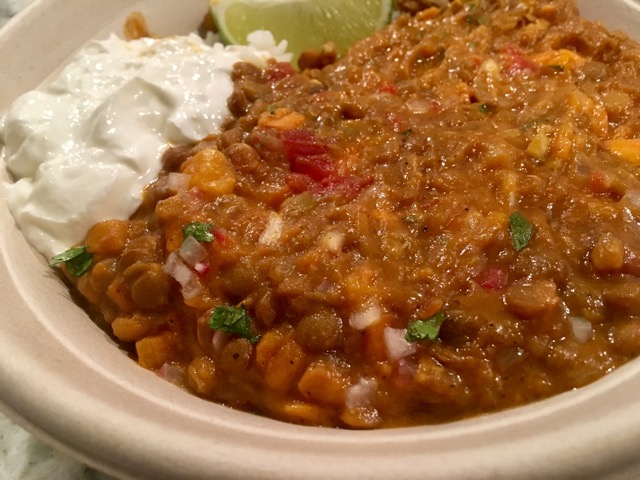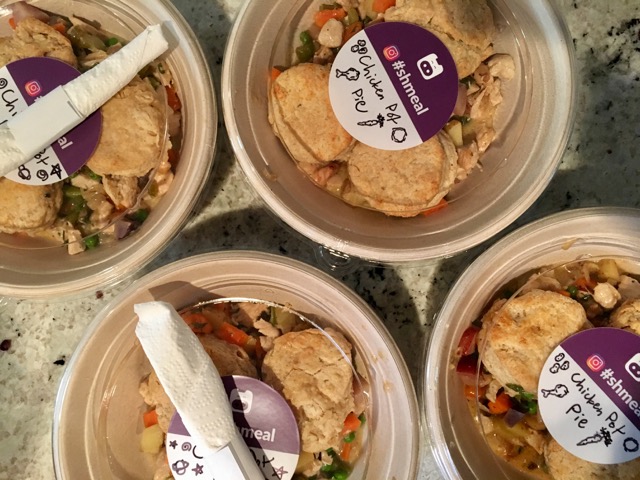You let strangers drive you around in their cars. You rent their apartments when they’re away. So would you buy a home-cooked meal from a random person—me, let's say—then come to my house and pick it up?
Would you feel safe eating my food? (You’d be fine, I promise.) Would I feel safe with you at my door?
So many questions swirled through my head when I heard about Shmeal, a new Chicago-based meal-sharing app. The idea, says its creators, Craig Silver and Justin Hamer, is not to foster my apparent anxiety but to connect those who cook with those who don’t.
"The joke has been that we really like cooking for other people, but even more, we like having other people cook for us. It's like our little scheme," says Silver, 28, who worked in software marketing before launching Shmeal with Hamer, 29, formerly a web developer. The two avid cooks have been friends since childhood.
Shmeal differs from other meal-sharing services like Meal Sharing and EatWith in that you don't actually sit and eat with the people you're feeding. And it's cheaper—$6 a meal. (Payments are processed through the app.) The cook pockets $5.50 and the remainder covers the cost of containers, which Silver and Hamer provide. Users can see available "shmeals" in their vicinity and who’s cooking them. Choose one, set a pickup time, and dinner, once you go get it, is served.
On the cook’s end, it's up to you to post pretty photos and pithy descriptions of your food and, of course, to deliver on what you promise. But you get more control too. You can deny a request if, say, you realize you don't have enough food.
"Our goal is to make it a win-win relationship between cooks and eaters," says Silver, who likens the app to a cross between Uber, Instagram, and McDonald's.
After testing it out as both cook and eater, I'd say it's also a little like Tinder (or what I've heard Tinder is like) plus Chopped. You're going mostly on looks, you really hope people like you—er, your cooking—and, crap, they'll be here in five minutes! Plate it now!
My first Shmeal
Shmeal was still in the beta testing stage with only 15 registered cooks when I signed up a few weeks ago.
Food safety is a valid concern addressed in the app's fine print: "It is up to you to decide whether or not to offer a meal to a user, and it is up to you to decide whether or not to consume a meal offered by a cook." The vetting process for cooks is still a work in progress based largely on instinct, says Silver. After you sign up, he and/or Hamer will come to your apartment or house to check out you and your kitchen and give you a stack of containers and utensils.
"We go and talk to them, try to get a sense of what they're like. And then, I'd say, we just ask ourselves is this someone I'd feel good about getting a meal from," says Silver.
Basically, Shmeal is a proceed-at-your-own risk situation, and as Hamer assured me, Shmeal users are well-intentioned "early-adopter types." No one's out to poison each other. We all just want to eat good food, right?

Having already interviewed Silver, I felt comfortable ordering my first Shmeal from him. He and Hamer are the most prolific cooks on the app and besides, his sweet potato and lentil curry was my only option on this particular day. Bonus: He lives just 1.3 miles away, according to the app. I told my daughters what I was up to. Their collective reaction was, "Ew, I don't want to eat someone else's food." Apparently, paranoia is hereditary. I cooked them something quickly before heading out, accompanied by my still-curious older daughter.
Proper Shmeal conduct is to alert a cook through the app when you're on your way or outside, and to wait for him or her to come out. I pulled up to Silver's apartment a few minutes early. After a minute more, he emerged with my Shmeal. It was warm, packed with rice and the stew. It was all so easy—and cheap.
My 12-year-old had a bite in the car before we even drove away. "That's pretty good," she said. "Actually, it's really good."
Now, what to cook?
After Silver and Hamer "approved" me as a cook and delivered my takeout containers, I spent a good week debating what to make. The ideal Shmeal, I concluded, would be a one-pot dish, easily multiplied, already in my regular dinner rotation—and which I knew I already had a photo of: biscuit-topped chicken pot pie. Now to find that photo among the 2,851 others on my phone.
Ideally, cooking with Shmeal shouldn't take much effort. "That's our goal, to make it not that big a deal," says Silver. But high-achiever that I am, I don't see any way around not feeling a little stressed over the whole process, knowing that people are willing to pay for my food. You do have to plan and have a photo handy, and it's a good idea to decide on and post your Shmeals a day, even a week, in advance.
My first request popped up mid-morning. Two orders, 6:30 p.m. pickup, requested by… Craig Silver. Fair enough. A few hours later, another alert. Two more orders from a user named Kate, also 6:30 p.m. Now this felt real.
My 9-year-old insisted on helping chop and measure, which started out swimmingly. But by 5:50 p.m., panicked, I sent a message to my, um, customers in the chat function of the app that I was running 10 minutes behind. I settled back down once the pie was out of the oven. The girls decorated the labels for the containers while I portioned out hefty servings with three biscuits each. These are big 32-ounce containers; a poke bowl this size would cost at least $15.
Kate and Silver arrived at the same time—turns out, they used to work together, but he didn’t put her up to ordering from me—and I felt surprisingly giddy as I handed over their dinner. The pot pie was spot-on golden and bubbly, and I was up $22.
Silver messaged me later that evening. “That was delicious, Janet! Thanks for sharing!” My next Shmeal, I’d already decided, would be lasagna.




